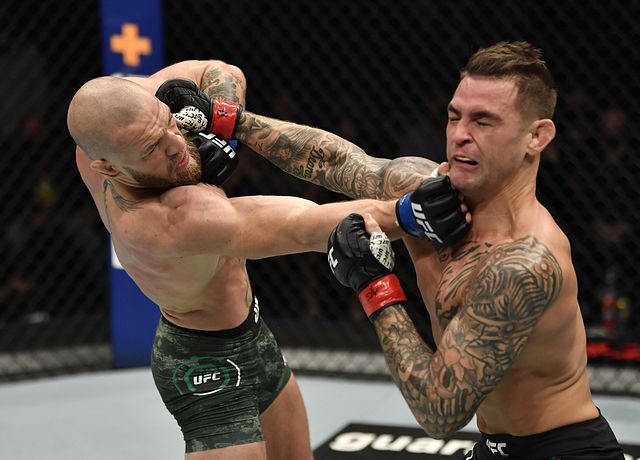* * *
Trilogies at their best are career-defining affairs, the opportunity for a fighter to prove his supremacy once and for all over a major career rival. The strongest examples historically have come in boxing, with the likes of Muhammad Ali-Joe Frazier, Marco Antonio Barrera-Erik Morales and Arturo Gatti-Mickey Ward. In MMA, Randy Couture-Chuck Liddell took place at the perfect moment, with an expanding audience coming in for the second and third fights to see “The Iceman” illustrate his dominance of the UFC light heavyweight division. These are the sorts of wins that define a career.
For Dustin Poirier, that is basically the meaning of his UFC 264 main event opposite Conor McGregor on Saturday in Las Vegas. Appreciated for his crowd-pleasing style but underrated when it came to widespread acknowledgement of his skills, Poirier spent much of his career looking for a keystone win or two that would make clear just how good he was. His string of wins in 2017-19 over Anthony Pettis, Justin Gaethje, Eddie Alvarez and Max Holloway made his ability hard to deny. However, the win over McGregor earlier this year took him to a much higher level still with the general public.
It’s one thing to defeat elite contenders and former champions who are well respected among fight fans. It’s another to defeat the biggest superstar in the history of the sport. The only other men to accomplish that in the Ultimate Fighting Championship were Nate Diaz and Khabib Nurmagomedov, and both surged to even higher levels of stardom in the process. It remains to be seen how much interest Poirier commands when he’s back to fighting opponents other than McGregor, but the odds seem good that he, too, will benefit for the rest of his career. If he can beat McGregor again to close out the trilogy, it seems likely that will be what he is most remembered for.
While those are the stakes for Poirier, the stakes for McGregor are much less straightforward. Winning a trilogy over Poirier is an impressive accomplishment, but it doesn’t register in the same way as becoming world champion in two different weight classes or ending Jose Aldo’s 10-year undefeated run. It’s not simply that it’s difficult for great fighters’ futures to match their storied pasts; there’s also the matter of what a win over Poirier would mean for the present. Many would argue Poirier is the best active lightweight, but Charles Oliveira holds the gold and has won nine straight bouts. Meanwhile, Nurmagomedov still lingers. He’s the man who could offer McGregor the opportunity at ultimate validation, but he has no interest in giving him the chance.
Also diminishing the import of the win for McGregor is the way this trilogy has gone down. McGregor’s knockout of Poirier in less than two minutes the first time out created the impression in the minds of many that he was simply at a higher level than the Louisiana native. Rightly or wrongly—probably wrongly—that sentiment calcified in the following years. McGregor now finds himself in a pick’em trilogy fight with an opponent once perceived to be below his level. It’s not an ideal position to be in.
If this fight doesn’t offer McGregor the rewards often associated with a high-profile trilogy, what’s in it for the Irishman? In short, it offers McGregor the chance to regain control of the narrative of his career. This was no problem for McGregor early on. He talked so big and delivered so big that it was like he was willing events into existence. The pursuit of ever larger challenges brought about even more significant rewards, culminating in the Money Fight with Floyd Mayweather. It was at that point that McGregor started to lose control of the narrative. McGregor did better than many expected against Mayweather, but he was ultimately finished. His return to MMA didn’t go much better.
McGregor’s fight with Nurmagomedov did massive business, but he looked overmatched. No longer at the top of his division, McGregor found himself simply taking interesting fights like many fading fighters before him. A bout with Donald Cerrone went as well as could be expected, but Cerrone’s recent performances haven’t helped the stature of that victory. After that came the loss to Poirier. If McGregor loses again to Poirier, he will have lost three of his four fights since beating Eddie Alvarez nearly five years ago at Madison Square Garden.
That certainly won’t end McGregor’s ability to make bank anytime soon. There’s so much interest in McGregor and his fans have such an affinity for the man that he will still be able headline major pay-per-views for years to come if he wants. However, no matter how loquacious he is, he won’t be able to sell a convincing story about his path back to the top of the sport. He’ll be a 33-year-old whose best days came many years ago and a man who doesn’t have a win over a premier opponent since Barack Obama was President. With a big win over Poirier, McGregor can sell the idea that he’s as good as ever. A title shot might be next. A loss, and the Story of McGregor may slip away for good.



